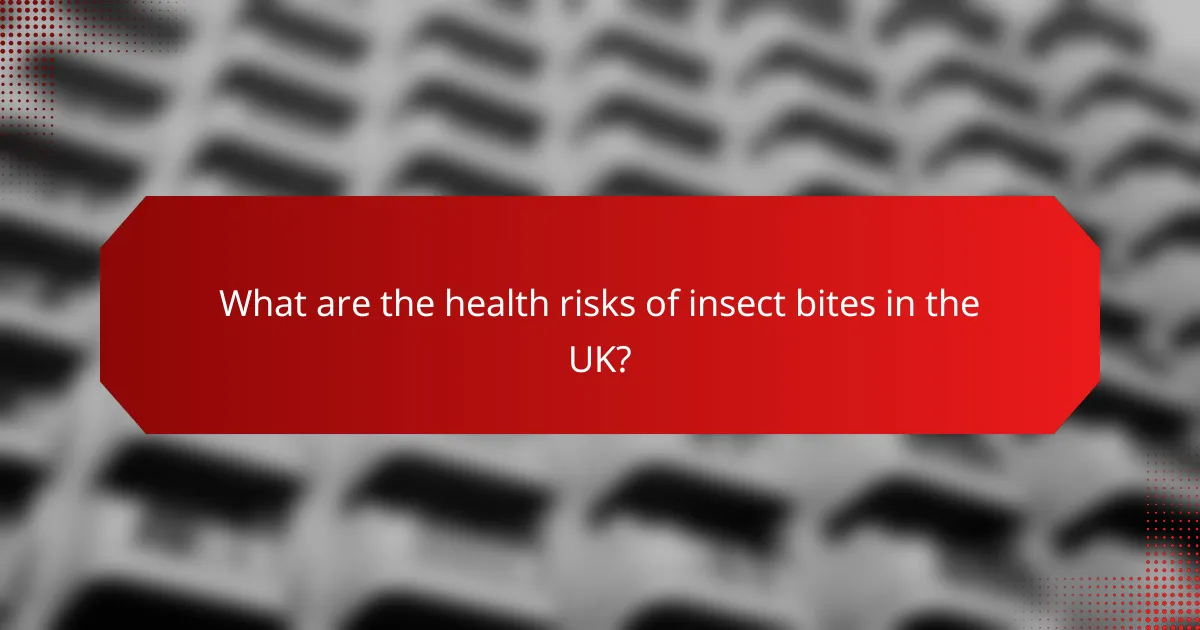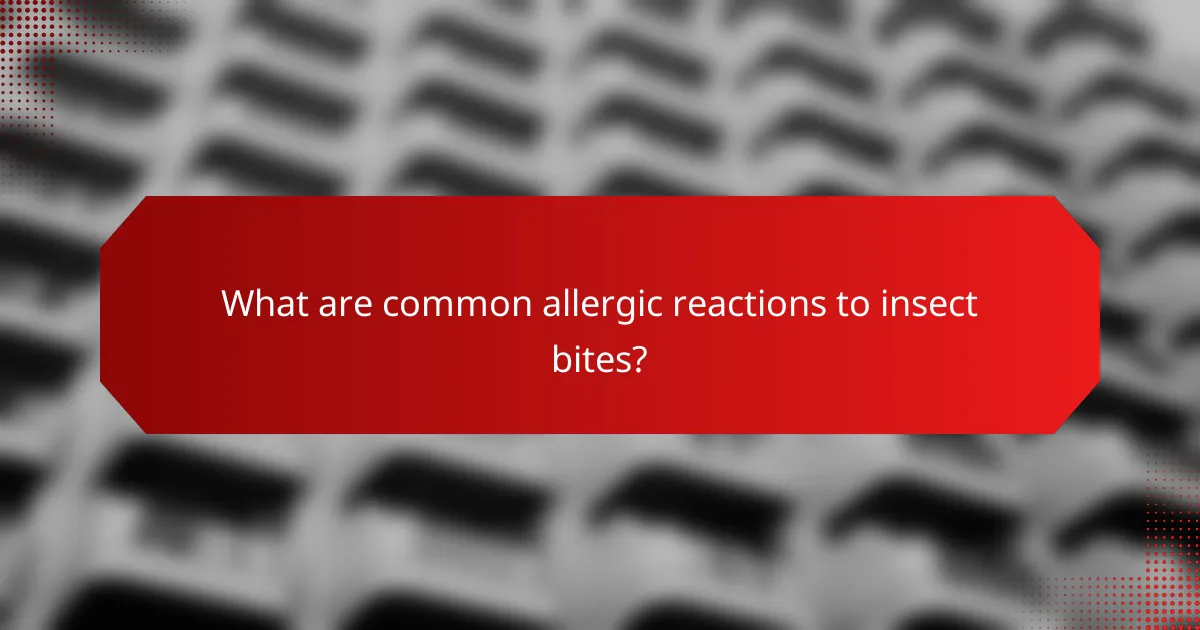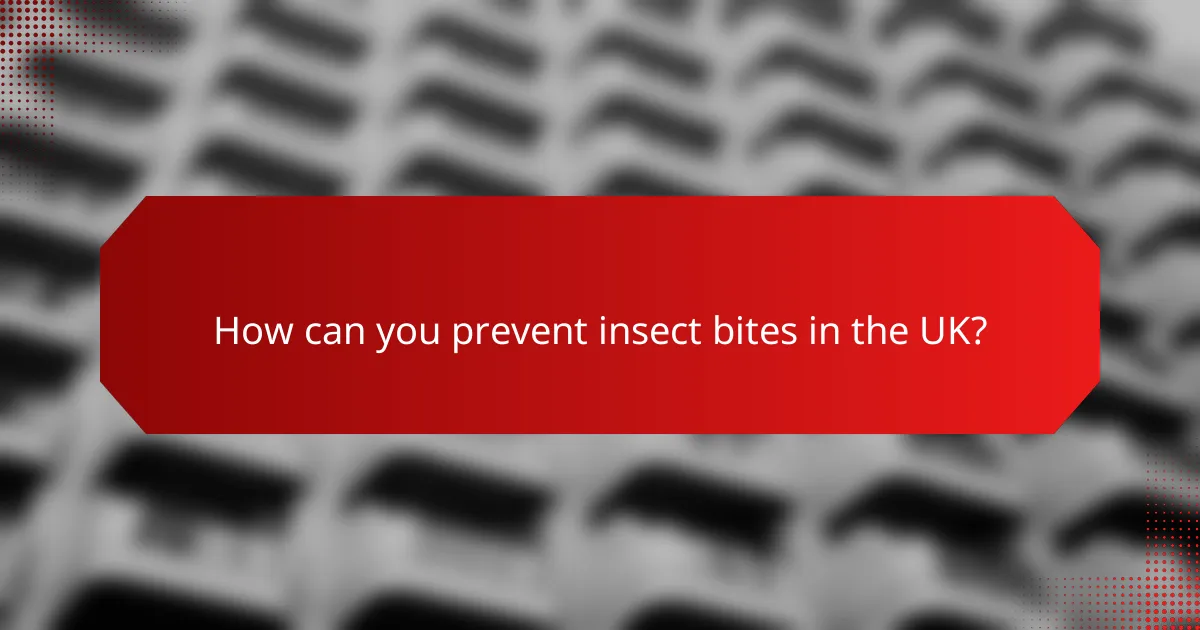Insect bites can present significant health risks, including infections, allergic reactions, and psychological effects. Recognizing these dangers is essential for effective prevention and treatment strategies. Additionally, the emotional impact of bites can lead to anxiety and fear, highlighting the importance of addressing both physical and psychological responses.

What are the health risks of insect bites in the UK?
Insect bites in the UK can pose several health risks, including infections, allergic reactions, and the potential transmission of diseases. Understanding these risks is crucial for effective prevention and treatment.
Infection from bites
Infections can occur when bacteria enter the body through broken skin caused by insect bites. Common signs of infection include redness, swelling, warmth, and pus at the bite site. Prompt cleaning and monitoring of the bite area can help reduce the risk of infection.
If an infection develops, it may require medical attention and possibly antibiotics. Keeping the bite clean and avoiding scratching are essential steps in preventing infection.
Allergic reactions to insect venom
Some individuals may experience allergic reactions to insect venom, which can range from mild to severe. Symptoms of a mild reaction include localized swelling and itching, while severe reactions, known as anaphylaxis, can cause difficulty breathing, swelling of the face or throat, and a rapid drop in blood pressure.
For those with known allergies, carrying an epinephrine auto-injector is advisable. If a severe reaction occurs, seek emergency medical help immediately.
Transmission of diseases
While the risk of disease transmission from insect bites in the UK is relatively low compared to other regions, certain insects can still carry pathogens. For example, ticks can transmit Lyme disease, and mosquitoes can carry viruses such as West Nile virus.
To minimize the risk of disease, use insect repellent, wear protective clothing, and check for ticks after outdoor activities. If you suspect a disease from a bite, consult a healthcare professional for appropriate testing and treatment.

How to treat insect bites effectively?
Treating insect bites effectively involves reducing symptoms like itching and swelling while preventing infection. Common methods include using over-the-counter antihistamines and home remedies, with a clear understanding of when to seek medical attention.
Over-the-counter antihistamines
Over-the-counter antihistamines can help alleviate itching and swelling caused by insect bites. Medications such as diphenhydramine (Benadryl) or cetirizine (Zyrtec) are commonly used and can provide relief within a short time frame.
When using antihistamines, follow the dosage instructions on the package. Be cautious, as some antihistamines can cause drowsiness, so avoid activities that require full alertness if you experience this side effect.
Home remedies for relief
Home remedies can offer additional relief from insect bites. Applying a cold compress or ice pack to the affected area can reduce swelling and numb the pain. Alternatively, a paste made from baking soda and water may help soothe the skin.
Other popular remedies include aloe vera, which has anti-inflammatory properties, and honey, known for its natural healing effects. Always test a small area first to ensure there’s no allergic reaction to these substances.
When to seek medical attention
Seek medical attention if you experience severe symptoms such as difficulty breathing, swelling of the face or throat, or a rapid heartbeat, as these may indicate an allergic reaction. Additionally, if the bite area shows signs of infection, such as increased redness, warmth, or pus, consult a healthcare professional.
For bites from potentially dangerous insects, like certain spiders or ticks, it’s crucial to get medical advice promptly. Early treatment can prevent complications and ensure proper care.

What are the psychological effects of insect bites?
Insect bites can lead to various psychological effects, including anxiety, fear, and even post-traumatic stress disorder (PTSD). These reactions often stem from the physical pain of the bite, the fear of potential allergic reactions, or past traumatic experiences related to insects.
Post-traumatic stress disorder
Post-traumatic stress disorder (PTSD) can occur in individuals who have experienced severe insect bites, particularly if the incident was traumatic or resulted in a serious allergic reaction. Symptoms may include flashbacks, nightmares, and heightened anxiety when encountering insects. Treatment often involves therapy and, in some cases, medication to help manage symptoms.
For those at risk, it is essential to seek professional help if symptoms persist. Support groups can also provide a sense of community and understanding, which may aid in recovery.
Anxiety and phobias related to insects
Anxiety and phobias about insects, known as entomophobia, can develop after experiencing painful bites or witnessing others react severely to insect stings. Individuals may experience panic attacks, avoidance behaviors, and excessive worry about being bitten. These feelings can significantly impact daily life, leading to avoidance of outdoor activities or social situations.
To manage these anxieties, cognitive-behavioral therapy (CBT) is often effective. Gradual exposure to insects in a controlled environment can also help desensitize individuals to their fears. Practicing relaxation techniques, such as deep breathing or mindfulness, can further alleviate anxiety symptoms.

What are common allergic reactions to insect bites?
Common allergic reactions to insect bites can range from mild localized swelling to severe systemic responses. These reactions occur when the immune system overreacts to proteins in the insect’s saliva, leading to various symptoms that can vary in intensity.
Symptoms of allergic reactions
Symptoms of allergic reactions to insect bites typically include redness, swelling, and itching at the site of the bite. Some individuals may also experience hives or rashes that extend beyond the bite area.
In more pronounced cases, symptoms can escalate to include nausea, headache, and fatigue. These reactions can develop within minutes to hours after the bite, making it important to monitor for changes in condition.
Severe reactions requiring emergency care
Severe allergic reactions, known as anaphylaxis, can occur and require immediate medical attention. Symptoms of anaphylaxis may include difficulty breathing, swelling of the face or throat, rapid heartbeat, and a sudden drop in blood pressure.
If someone exhibits signs of anaphylaxis after an insect bite, it is crucial to call emergency services right away. Carrying an epinephrine auto-injector can be life-saving for individuals with known severe allergies, and it should be used as directed in such emergencies.

How can you prevent insect bites in the UK?
Preventing insect bites in the UK involves using effective repellents, wearing suitable clothing, and making modifications to your environment. These strategies can significantly reduce the risk of bites from mosquitoes, ticks, and other insects.
Use of insect repellent
Insect repellents containing DEET, picaridin, or oil of lemon eucalyptus are effective in deterring bites. Look for products with at least 20% concentration for optimal protection, especially during peak insect activity times, such as dawn and dusk.
Apply repellent to exposed skin and clothing, but avoid contact with eyes and mouth. Reapply every few hours, or more frequently if sweating or swimming, to maintain effectiveness.
Protective clothing and gear
Wearing long sleeves, long pants, and socks can provide a physical barrier against insect bites. Light-colored clothing is preferable, as it is less attractive to many insects.
Consider using permethrin-treated clothing for added protection. This insecticide can remain effective through multiple washes, offering prolonged defense against bites.
Environmental modifications
Modifying your surroundings can help reduce insect populations. Keep your garden tidy by removing standing water, which serves as a breeding ground for mosquitoes, and regularly trim vegetation to minimize hiding spots for ticks.
Using screens on windows and doors can prevent insects from entering your home. Additionally, consider using citronella candles or essential oil diffusers outdoors to deter insects naturally.

What are the long-term effects of insect bites?
The long-term effects of insect bites can include chronic pain, skin conditions, and psychological impacts. These effects vary based on the type of insect, the individual’s health, and how they respond to the bite.
Chronic pain or discomfort
Chronic pain or discomfort can arise from insect bites, particularly if the bite leads to an infection or an allergic reaction. This pain may persist for weeks or even months, affecting daily activities and quality of life.
Individuals may experience localized pain at the bite site or more generalized discomfort. It’s essential to monitor symptoms and seek medical advice if pain continues or worsens over time.
Skin conditions resulting from bites
Insect bites can lead to various skin conditions, including allergic dermatitis, hives, or secondary infections. These conditions may manifest as redness, swelling, or itching, and can become chronic if not treated properly.
To prevent long-term skin issues, it’s crucial to keep the bite area clean and avoid scratching. Over-the-counter creams or antihistamines can help manage symptoms, but persistent cases should be evaluated by a healthcare professional.

What are the best practices for managing allergic reactions?
Managing allergic reactions effectively involves prompt identification and treatment of symptoms, as well as understanding potential triggers. Key practices include carrying emergency medication, such as epinephrine auto-injectors, and educating yourself and others about your allergies.
Identifying triggers
Identifying triggers is crucial for managing allergic reactions. Common triggers include certain foods, insect stings, medications, and environmental factors like pollen or pet dander. Keeping a detailed diary of symptoms and exposures can help pinpoint specific allergens.
Consider undergoing allergy testing with a healthcare professional to confirm suspected triggers. Skin tests or blood tests can provide insights into what substances may cause reactions, allowing for more targeted avoidance strategies.
Once triggers are identified, create an action plan that includes avoiding these allergens and knowing how to respond if exposure occurs. This plan should be shared with family, friends, and caregivers to ensure a quick and effective response during an allergic reaction.
